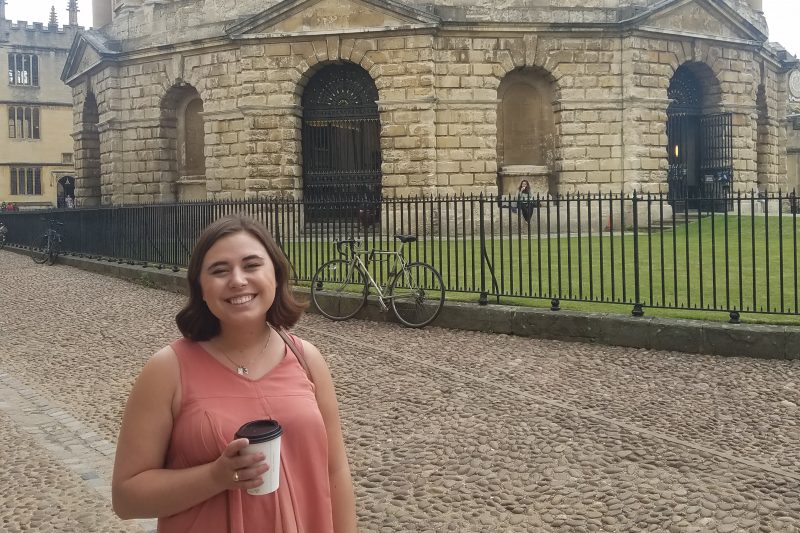Summer at Oxford Danielle Hughson's honors thesis will be focused on male editorial control and how it affects female writers, within a familial and patriarchal context.
“Being exposed to different demographics and different learning and teaching styles, as well as a completely different culture, helps to make one a more well-rounded student and a more well-rounded person.”
— Danielle Hughson ’18
Hometown: Coeur d’Alene, Idaho
Major: English
Minors: Women, Gender, Sexuality Studies; Education Policy
Tell us a little bit about your summer opportunity.
I spent eight weeks this summer in Oxford, doing research on my senior honors thesis in English. I came through the Virginia Program at Oxford, through which I studied there last summer and this summer, I was invited to come back and do independent research. My honors thesis will be focused on male editorial control and how it affects female writers, within a familial and patriarchal context. This summer I worked on Anne Bradstreet (17th century) and Sylvia Plath (20th century).
This opportunity was funded by a Johnson Opportunity Grant, SSRI and Mellon Grant.
What did you like best about the location?
I lived and studied in St. Anne’s College, Oxford, where I had access to two beautiful and extensive libraries: the Bodleian Library and the library at St. Anne’s. St. Anne’s was originally a women’s college, and women were not permitted to use the Bodleian, so the library at St. Anne’s has one of the largest collections of the various Oxford colleges. Using those two libraries was a highlight of my experience.
What did an average day for you look like?
On an average day, I attended the lecture offered through the Virginia Program before settling into the library at St. Anne’s — or I would walk down to the Bodelian, in the center of Oxford. There I would read and collect notes. A few weeks in, I started writing preliminary thoughts on my thesis. In the afternoons, I met with my two advisers in Oxford, going over my sources and discussing possible directions for my thesis.
Who served as a mentor to you this summer, and what was the best thing they taught you?
Both of my Oxford supervisors, Glyn Redworth and Christine Gerrard, taught me a lot about patience and attention to detail. Professor Holly Pickett, who was supervising VPO, taught me the value of constant reassurance and support. She consistently listened to me about my frustrations and thoughts on Anne Bradstreet and Sylvia Plath, and offered support and feedback.
What was the most rewarding part of the experience?
I think being able to sit down and discuss my thoughts one-on-one with two prominent scholars taught me a lot about how to defend my ideas but also how to take criticism on where there are weakness in my argument and how to refine it. In addition, learning how to work on a project of this scale with the advice of two people who have written books was incredibly fascinating.
What was the biggest challenge you faced?
The biggest challenge was trying to keep myself on a schedule. When you have a project on such a large scale, it’s easy to get overwhelmed by the number of sources or the sheer amount of scholarship on the subject. Being completely self-motivated and self-regulated meant that I had to know how much I needed to read in a day, and how much I could get through in a day.
What have you learned at W&L that helped you in this endeavor, and what will you bring back to your life on campus?
Washington and Lee has taught me how to pace myself in my endeavors, to enjoy the place around me while also staying focused on the project I am working on. Oxford, in turn, has taught me a very different system of academics, from the arrangement of the libraries to the way academics interact with their students. I think this will bring me a valuable perspective in my future work on my thesis, as well as when I eventually enter the teaching force next May through Teach for America.
Has this experience impacted your studies or future plans in any way?
I have accepted a position in Nashville with Teach for America. This academic experience has allowed me to view a very different academic system, which I will hope to implement in my own classroom in certain ways, allowing for a global perspective to work on a more local level.
Why is this kind of experience important to W&L students?
I think it’s important to cherish one’s time in Lexington while also being aware of the global opportunities available for academic pursuits. Being exposed to different demographics and different learning and teaching styles, as well as a completely different culture, helps to make one a more well-rounded student and a more well-rounded person.
Describe your summer adventure in one word:
Erudite
If you know any W&L students who would be great profile subjects, tell us about them! Nominate them for a web profile.
 Danielle Hughson ’18 in Oxford
Danielle Hughson ’18 in Oxford
You must be logged in to post a comment.